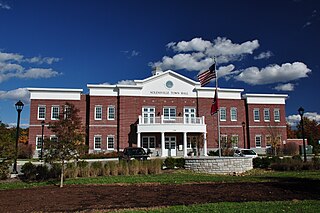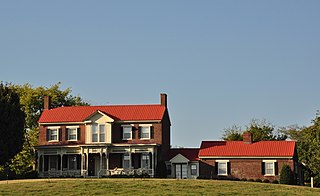Jordan–Williams House | |
The Jordan–Williams House in November 2013 | |
| Location | Rocky Fork Rd. 2 mi. E of Nolensville, Nolensville, Tennessee |
|---|---|
| Coordinates | 35°56′36″N86°37′14″W / 35.94333°N 86.62056°W Coordinates: 35°56′36″N86°37′14″W / 35.94333°N 86.62056°W |
| Area | 10 acres (4.0 ha) |
| Built | c.1855 |
| Architect | Unknown |
| Architectural style | Italianate, Central passage plan |
| MPS | Williamson County MRA [1] |
| NRHP reference # | 88000341 [2] |
| Added to NRHP | April 13, 1988 |
The Jordan–Williams House is an Italianate style house in Nolensville, Tennessee that was listed on the National Register of Historic Places in 1988.

The Italianate style of architecture was a distinct 19th-century phase in the history of Classical architecture.

Nolensville is a town in Williamson County, Tennessee. The population was 5,861 at the 2010 census. It was established in 1797 by William Nolen, a veteran of the American Revolutionary War. Located in Middle Tennessee, it is about 22 miles southeast of Nashville, Tennessee. The town was re-incorporated in 1996.

The National Register of Historic Places (NRHP) is the United States federal government's official list of districts, sites, buildings, structures, and objects deemed worthy of preservation for their historical significance. A property listed in the National Register, or located within a National Register Historic District, may qualify for tax incentives derived from the total value of expenses incurred preserving the property.
It was built or has other significance as of c.1855, and includes Central passage plan and Italianate architecture. When listed the property included one contributing building, one non-contributing building, and two non-contributing structures, on an area of 10 acres (4.0 ha). [2]
According to a 1988 study of Williamson County historical resources, it is one of a handful of notable, historic Italianate style residences in the county, others being the James Wilhoite House, the John Hunter House, the Owen-Cox House, the Y.M. Rizer House (c. 1875, a combination of Italianate and Second Empire design), the Henry Pointer House, the Andrew C. Vaughn House, and the Thomas Critz House. [1]

Williamson County is a county in the U.S. state of Tennessee. As of the 2010 United States Census, the population was 205,226. The county seat is Franklin. The county is named after Hugh Williamson, a North Carolina politician who signed the U.S. Constitution. Adjusted for relative cost of living, Williamson County is one of the wealthiest counties in the United States.

The James Wilhoite House is a historic Italianate style house in Allisona, Tennessee, United States, that was listed on the National Register of Historic Places in 1988. The property is also known as the Reed Corlette House. It was built, remodeled, or has other significance in c. 1877, c. 1900, and c. 1910.

The John Hunter House, also known as McCullough House, near Franklin, Tennessee is an Italianate style house that was built in 1875. It was listed on the National Register of Historic Places (NRHP) in 1988.
The property is denoted as Williamson County historic resource WM-197. [2]
The house "features an elaborate milled porch with extensive decoration and is one of the best examples of this style home in the county." Built by Edward J. Jordan, it became the home of his daughter Elizabeth and her husband Thomas G. Williams, who had served in the 20th Tennessee Infantry. [3]










